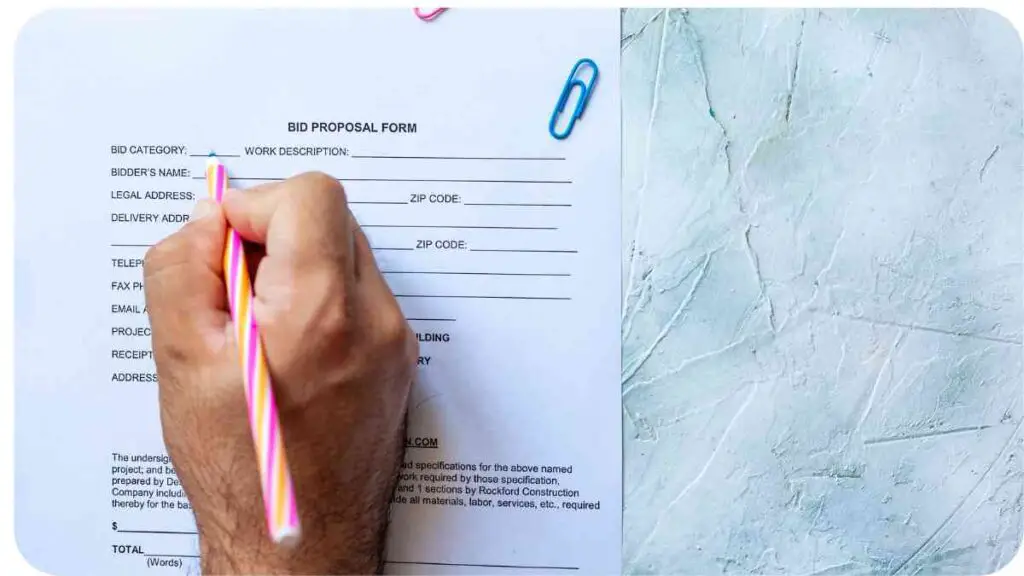When it comes to lawn care, presenting a well-crafted proposal can make a world of difference. Whether you’re a professional landscaper or a homeowner seeking services, a detailed and clear proposal sets the tone for a successful project.
So, how do you write up a proposal for lawn care that stands out? Let’s dive into the essentials of creating a proposal that not only outlines your services but also builds trust and professionalism.
| Key Points |
|---|
| A lawn care proposal outlines the services offered, pricing, and terms, setting clear expectations. |
| Start by gathering client information and structuring your proposal with an introduction, scope of work, pricing, timeline, and terms. |
| Ensure your proposal is detailed, well-organized, and uses clear language to avoid misunderstandings. |
| Personalize your proposal and use visuals to make it stand out and engage clients. |
| Highlight your unique selling points and provide examples of successful projects to build credibility. |
Understanding Lawn Care Proposals

What is a Lawn Care Proposal?
A lawn care proposal is a document that outlines the services you offer and provides a clear plan for maintaining or improving a lawn. It typically includes details about the work to be done, costs, timelines, and terms of service. Think of it as a roadmap that guides both you and your client through the project.
Lawn care services often involve regular fertilization to maintain a healthy, vibrant lawn. By understanding how often to use liquid fertilizer, you can ensure that your proposal includes the best practices for keeping lawns lush and green throughout the season.
Why is a Proposal Important?
A proposal is crucial for several reasons:
- Clarity: It provides a clear understanding of what is included in the lawn care services.
- Professionalism: A well-prepared proposal reflects professionalism and can set you apart from competitors.
- Agreement: It acts as a formal agreement between you and the client, reducing the likelihood of misunderstandings.
Key Components of a Lawn Care Proposal
Introduction and Company Overview
Your proposal should start with a warm introduction. Include a brief overview of your company, highlighting your experience, qualifications, and commitment to quality. This section is your chance to make a great first impression!
Table: Company Overview Example
| Component | Details |
|---|---|
| Company Name | Green Thumb Landscaping |
| Experience | 10 years in residential and commercial lawn care |
| Services Offered | Mowing, fertilization, pest control, aeration |
| Certifications | Licensed and insured |
Scope of Work
Detail what services will be provided. Be specific about the tasks you will perform, such as mowing, fertilization, or weed control. This helps manage client expectations and ensures that nothing is overlooked.
A crucial part of any lawn care proposal is detailing methods for maintaining a green, healthy lawn. Knowing the best way to green up a lawn can demonstrate your expertise and commitment to providing top-notch services to potential clients.
Table: Scope of Work Example
| Task | Description |
|---|---|
| Mowing | Weekly mowing of lawn area |
| Fertilization | Monthly application of fertilizer |
| Weed Control | Bi-weekly weed removal |
| Aeration | Seasonal lawn aeration |
Pricing and Payment Terms
Clearly outline your pricing structure. Include details on how and when payments should be made, such as a deposit and final payment. This section helps avoid any confusion regarding costs.
Table: Pricing Example
| Service | Cost |
|---|---|
| Mowing | $50 per visit |
| Fertilization | $75 per month |
| Weed Control | $40 per visit |
| Aeration | $100 per session |
Timeline
Provide an estimated timeline for completing the work. This includes the start date, key milestones, and expected completion date. A clear timeline helps manage client expectations and ensures that both parties are on the same page.
Terms and Conditions
Include any terms and conditions related to the services you offer. This might cover aspects such as cancellations, rescheduling, and any other policies relevant to your business.
How to Write the Proposal

Gathering Information
Start by gathering all necessary information about the client’s lawn and their needs. This includes site visits, client preferences, and any specific requirements they might have.
Structuring the Proposal
Organize your proposal logically. Start with an introduction, followed by the scope of work, pricing, timeline, and terms. Ensure that each section is clearly labeled and easy to navigate.
When offering lawn care services, it’s important to address common issues like burnt grass. Including strategies on how to fix burnt grass in your proposal can show clients that you’re prepared to handle any lawn challenges they may face.
Writing the Proposal
When writing, use clear and concise language. Avoid jargon and be as specific as possible. Your goal is to make the proposal easy to understand and to communicate your professionalism and reliability.
Common Mistakes to Avoid
Lack of Detail
Avoid vague descriptions. Clients need to understand exactly what they are paying for, so provide detailed information about the services included.
Poor Formatting
Ensure your proposal is well-organized and visually appealing. Use headings, bullet points, and tables to make it easy for clients to read and understand.
Unclear Pricing
Be transparent about your pricing. Hidden costs or unclear pricing can lead to misunderstandings and dissatisfaction.
Tips for a Winning Proposal
Personalize Your Proposal
Tailor each proposal to the specific needs and preferences of the client. Mentioning details unique to their property or preferences shows that you’ve put thought into their project.
Use Visuals
Incorporate visuals such as charts, images, or diagrams to make your proposal more engaging and easier to understand. Visuals can help illustrate the benefits of your services.
Highlight Your Unique Selling Points
Showcase what sets you apart from competitors. Whether it’s your experience, unique services, or customer satisfaction guarantees, make sure to emphasize your strengths.
Proposals for lawn care should cover all aspects of lawn maintenance, including pest control. By highlighting what bugs may be in grass, you can assure clients that you have the knowledge and tools to keep their lawns free from harmful pests.
Examples of Successful Lawn Care Proposals
Case Study 1: Residential Lawn Care
[Include details about a successful residential lawn care project, including client goals, services provided, and results achieved.]
Case Study 2: Commercial Lawn Care
[Include details about a successful commercial lawn care project, including client goals, services provided, and results achieved.]
Conclusion
Writing a lawn care proposal may seem daunting, but with the right approach, you can create a document that clearly communicates your services and builds trust with potential clients. By including detailed information, avoiding common mistakes, and following best practices, you’ll be well on your way to crafting winning proposals.
FAQs
What should be included in a lawn care proposal?
A lawn care proposal should include an introduction, scope of work, pricing, timeline, and terms and conditions.
How detailed should a lawn care proposal be?
The proposal should be detailed enough to clearly communicate the services provided, pricing, and any terms or conditions. Avoid vague descriptions.
How can I make my proposal stand out?
Personalize the proposal, use visuals, and highlight your unique selling points to make it stand out from competitors.
What common mistakes should I avoid?
Avoid vague descriptions, poor formatting, and unclear pricing to ensure your proposal is effective and professional.
Proper maintenance of lawn care equipment is essential for delivering consistent service. In your proposal, you might want to include information on how to adjust a lawn mower belt, ensuring that your equipment is always in top working condition for the job.
How can I structure my proposal?
Organize your proposal with clear headings and sections, including an introduction, scope of work, pricing, timeline, and terms and conditions. Use bullet points and tables for clarity.
Further Reading
Lawn Care Proposal Example
Explore a detailed example of a lawn care proposal, including sample content and formatting tips to help you craft your own proposal.
PandaDoc Lawn Maintenance Proposal Template
Access a customizable lawn maintenance proposal template from PandaDoc to streamline your proposal creation process and ensure all key elements are included.
Proposal Kit: Lawn Care Proposal Sample
Review a sample lawn care proposal from Proposal Kit, featuring a comprehensive layout and content ideas to help you develop a professional proposal.
FAQs
What is a lawn care proposal?
A lawn care proposal is a document that outlines the services you offer, pricing, and terms of service for maintaining or improving a lawn. It helps set clear expectations and formalizes the agreement between you and the client.
How do I start writing a lawn care proposal?
Begin by gathering all relevant information about the client’s lawn and their needs. Structure your proposal with an introduction, scope of work, pricing, timeline, and terms and conditions.
What should be included in a lawn care proposal?
Include an introduction to your company, a detailed scope of work, clear pricing, an estimated timeline for the work, and any terms and conditions related to your services.
How can I make my lawn care proposal more professional?
Ensure your proposal is well-organized, detailed, and free of jargon. Use a clear layout with headings and tables, and consider including visuals to enhance understanding.
What common mistakes should I avoid in a lawn care proposal?
Avoid vague descriptions, poor formatting, and unclear pricing. Ensure your proposal is detailed, well-structured, and transparent to prevent misunderstandings.

For 15 years, Hellen James has worked in the gardening industry as an expert and landscape designer. During her career, she has worked for a variety of businesses that specialize in landscaping and gardening from small firms to large corporations.

